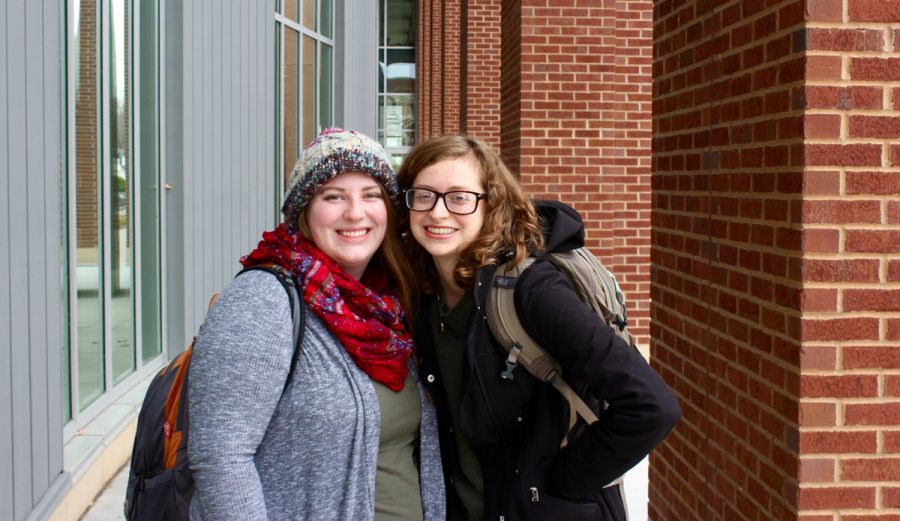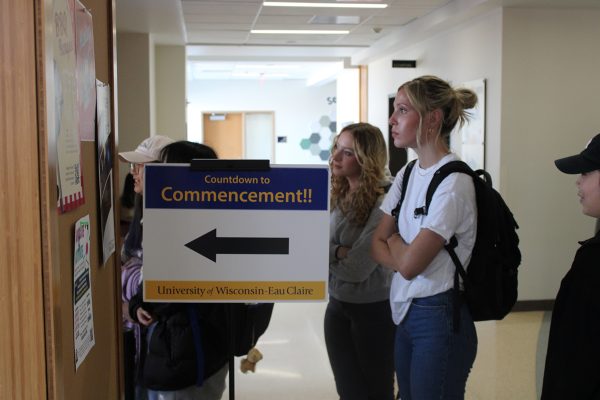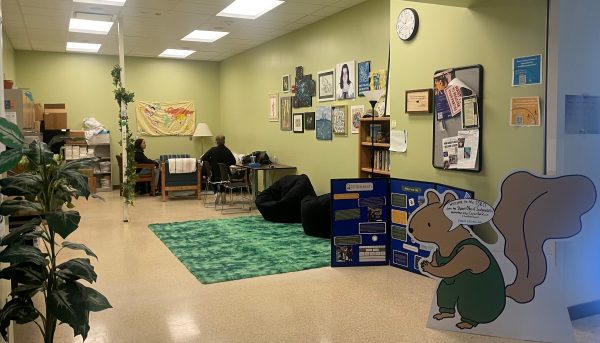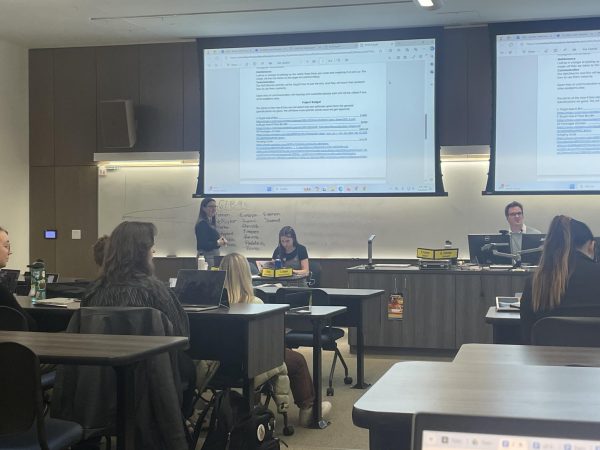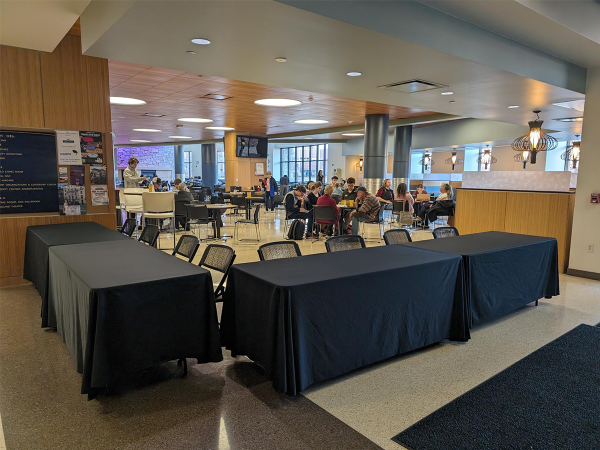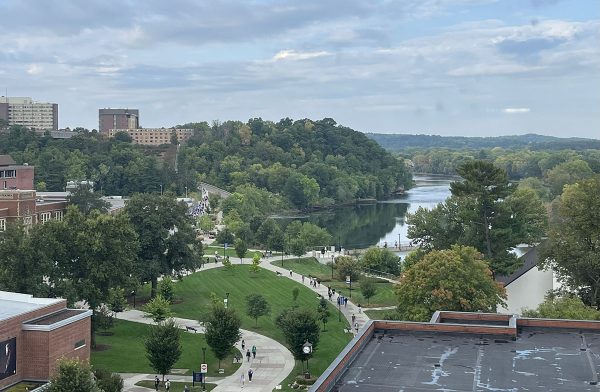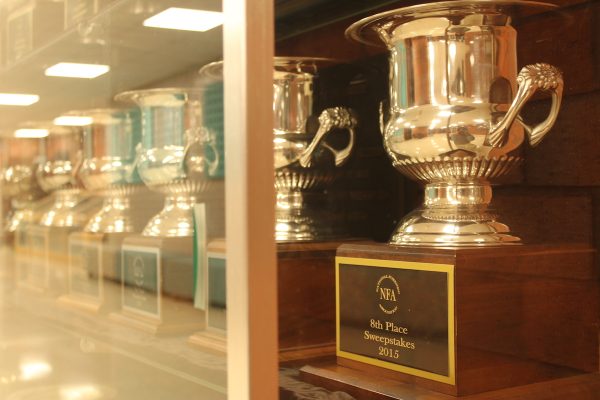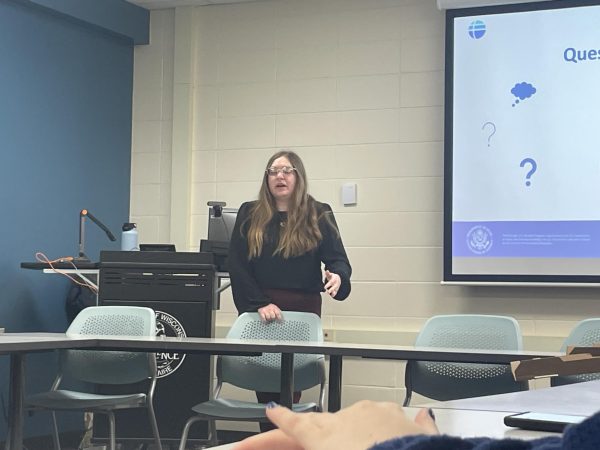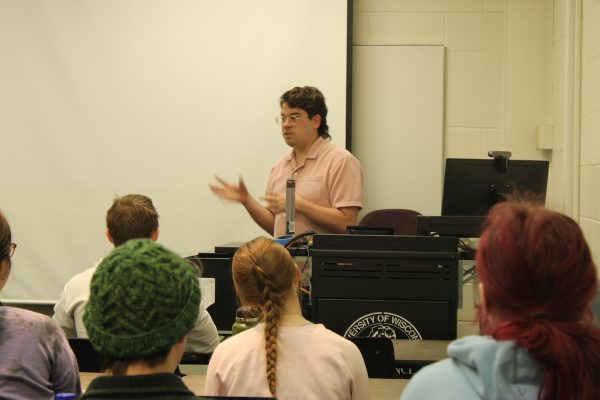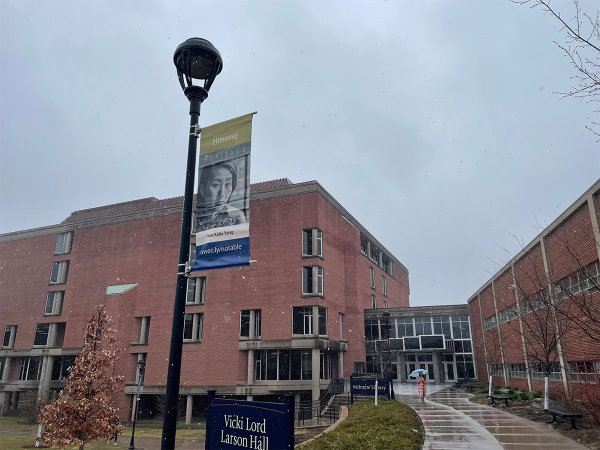Students take stand against poverty
Students take leadership roles in addressing community’s poverty problem
More stories from Nicole Bellford
Photo by Nicole Bellford
Rachel Esselman (left) and Sophia Thoen (right) have taken leadership roles at Eau Claire’s Clear Vision Poverty Summit, a program designed to address the area’s poverty issue.
According to the United States Census Bureau, 17.7 percent of the Eau Claire population lies below the poverty line.This amount surpases Wisconsin’s state average of 13.2 percent, as well as the national average of 14 percent.
In other words, 12,000 people in the Eau Claire area struggle with recurring food and home instability. Clear Vision reports Eau Claire’s homeless shelters deal with severe overflow problems almost every day.
In addition, one in five children in Eau Claire are food insecure and nearly 40 percent of students in the Eau Claire area school district qualify for free or reduced lunch.
While poverty is a clear problem on the rise in the Eau Claire area, UW-Eau Claire students Sophia Thoen and Rachel Esselman hope their efforts alongside the local community’s Clear Vision Poverty Summit will generate much needed change.
“We definitely have a poverty problem around here,” said Esselman, a senior English and psychology student. “People who aren’t as exposed to it may not realize it, but that doesn’t mean it’s not there, and that doesn’t mean we shouldn’t do something about it.”
The Clear Vision Eau Claire Program defines themselves as “an inclusive citizen-based community visioning and strategic planning initiative, with a mission to engage with the community for the common good.”
The program tackles a series of issues presenting themselves in Eau Claire by encouraging local members of varying social and economic classes to engage in civic discussion and problem-solving techniques. Clear Vision’s latest project is the area’s rising poverty problem.
As a result, Clear Vision’s Poverty Summit came to life. The summit holds meetings one to two times a month and lasts from October 2016 through March 2017.
During these meetings, wide ranges of community members, totalling nearly 200 attendees per meeting thus far, come together at Grace Lutheran Church and discuss methods to address the area’s poverty problem.
Among these community members are designated Poverty Summit coaches, such as Thoen and Esselman. The two young women, along with approximately 20 other university students, have taken leadership roles at the summit.
“Being a college student, sometimes I feel isolated from the real issues in Eau Claire’s community,” said Thoen, a sophomore social work student. “I thought that taking a leadership role at Clear Vision would give me a better perspective on the poverty problem and give me some hands on experience with helping others.”
Thoen and Esselman’s duties as Poverty Summit coaches primarily include being facilitators of discussion in assigned small groups. During prior meetings, community members picked their small groups based on topics of interest surrounding poverty, including health care, affordable housing, education and job security.
Within the small groups, Thoen and Esselman said they keep the discussion on track and provide activities in which community members can further their problem-solving techniques and develop specific strategies to generate realistic, step-by-step solutions to the issues at hand.
Clear Vision plans to utilize these proposed solutions following the conclusion of the Poverty Summit.
Thoen and Esselman first heard about the Poverty Summit through a shared professor, Ruth Cronje. Cronje is teaching an honors class this semester focused on engaging in proper problem-solving methods within the community and how to address public issues in a democratic society.
While Thoen and Esselman are required to attend the Poverty Summit for class credit, they decided to become coaches on their own.
“I was already pretty excited to attend the meetings and hear about an issue that affects the community,” Esselman said. “Being a coach seemed like an opportunity to carry over what I had learned in the classroom and apply it to a more real-world setting.”
Cronje, a professor in the department of English rhetorics of science, technology and culture, said she is proud of her students for taking the next step and getting involved in a vital community issue.
“It is very cool to see my students get the opportunity to be leaders,” Cronje said. “The coaches play an important role in the summit, and I love to see them engage with members of a larger community.”
Both Thoen and Esselman said they feel they have had a positive experience through coaching at the Poverty Summit and are eager to continue their efforts in the program.
Thoen explained her volunteer position at the Marshfield Clinic gave her some prior knowledge on the poverty issue in Eau Claire, seeing as many patients seeking treatment suffered from homelessness. However, she said she has learned the importance of conversation and civic engagement when addressing larger scale problems.
“Through volunteering, I knew there was a lot of poverty issues going on,” Thoen said. “But the summit has shown me that something as simple as conversation can get the ball rolling on finding a solution. I have really enjoyed meeting with people of all different backgrounds, and breaking down solutions as a collective group.”
Esselman emphasized her excitement with being an active part of community change rather than waiting for it.
“This tactic, it’s democracy done differently,” Esselman said. “It’s really cool that we are taking action rather than waiting for higher up levels of government to do something for us. It’s a really empowering thing.”
While Thoen and Esselman’s class requirements of attending the Poverty Summit end at the conclusion of the fall semester, the duo said they have made a commitment to being coaches and will stick with the program until its end this coming March.
Mike Huggins, a Clear Vision Poverty Summit co-chair, said students’ initiative in taking leadership roles, like Thoen and Esselman, is a true statement to their character.
“I am so thrilled to see the numbers of students volunteer as coaches in this process,” Huggins said. “The role of coaches is essential to the success of the action groups. The fact that we have so many students involved is a tremendous statement on both the commitment and integrity of these young people.”

